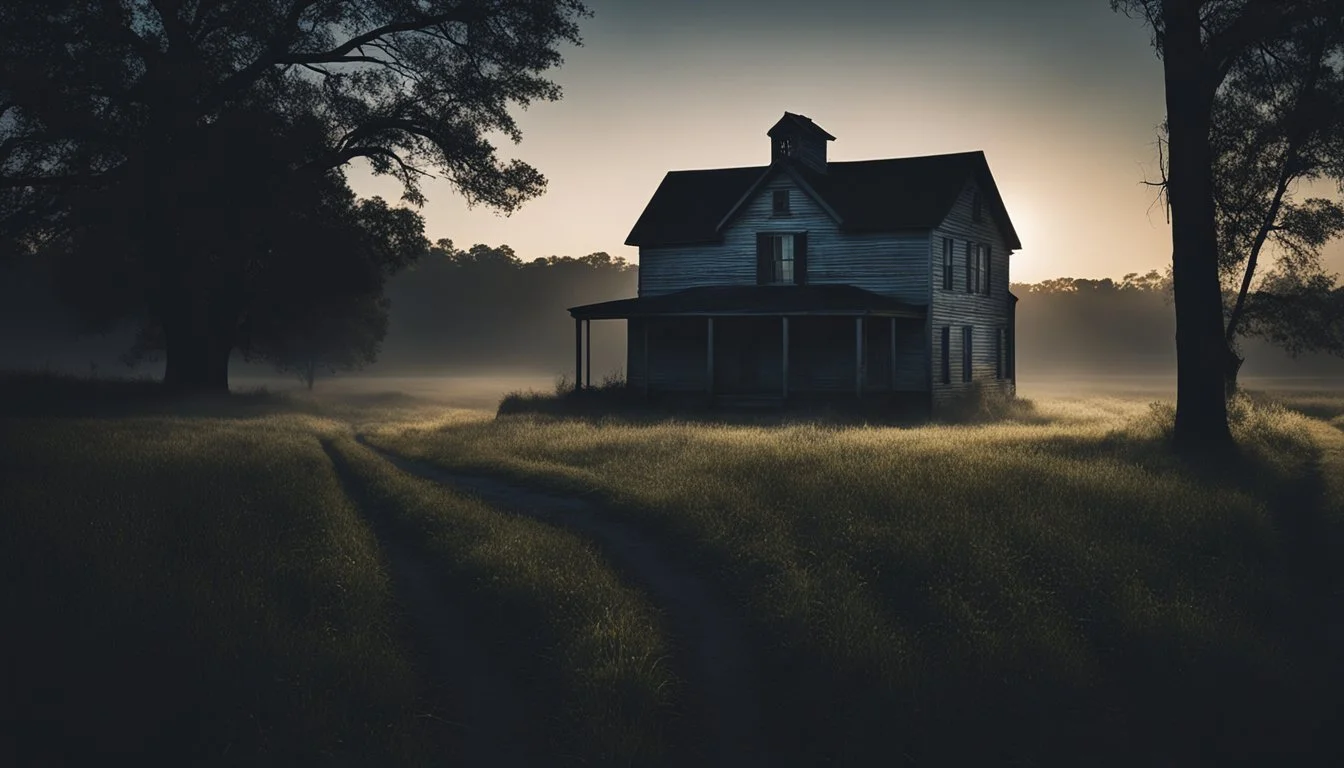6 True Crime Documentaries About Crimes in North Carolina
Unveiling Hidden Stories
North Carolina has been the backdrop for some of the most riveting and chilling true crime stories in the United States. From family tragedies to complex criminal enterprises, the state has seen a variety of cases that have captured the public's imagination and have been the subject of numerous documentaries.
For those intrigued by real-life mysteries and the quest for justice, there are several compelling documentaries that explore crimes committed in North Carolina. These films not only recount the grisly details of the crimes but also offer a deep dive into the investigations and the impact on the communities involved. With a blend of historical cases and more recent events, these documentaries provide a comprehensive view of crime in the Tar Heel State.
1) The Devil You Know (2019)
"The Devil You Know" is a true crime docu-series that first aired in 2019.
The series focuses on Pazuzu Algarad, a self-proclaimed Satanist from North Carolina, whose home became the site of multiple human remains discoveries.
Journalist Chad Nance leads the investigation, uncovering the grim details of how Algarad managed to gain influence and commit horrific crimes unnoticed for so long.
The series provides a detailed examination of the failures and circumstances allowing Algarad's reign of terror.
It sheds light on the psychological and social dynamics at play within Algarad's circle as well as the broader community.
"The Devil You Know" is available for streaming on Prime Video, where viewers can purchase episodes in HD.
For more details, visit IMDb.
2) American Murder: The Family Next Door (2020)
"American Murder: The Family Next Door" is a true crime documentary that aired on Netflix in 2020. It explores the tragic case of Chris Watts, who murdered his pregnant wife, Shanann Watts, and their two daughters.
Set in Frederick, Colorado, the documentary presents the story through real-life footage, including social media posts, law enforcement recordings, and text messages. This approach offers a deeply personal look into the events leading up to the crime.
The Watts family seemed like the quintessential suburban household, making the crime even more shocking. Shanann regularly shared her life on social media, providing a stark contrast between the family's public image and the dark reality that unfolded.
Viewers are taken through the investigation, revealing how Chris Watts initially denied any involvement before eventually confessing to the heinous acts. The film highlights the impact of the digital age on modern crime stories.
For more information on "American Murder: The Family Next Door," visit Wikipedia.
3) The Staircase (2004)
"The Staircase" is an acclaimed true crime documentary that premiered in 2004. It delves into the complex case of Michael Peterson, a novelist accused of murdering his wife, Kathleen.
Kathleen was found dead at the bottom of a staircase in their Durham, North Carolina home in 2001. Initially, Peterson claimed she had fallen, but subsequent investigations led to his indictment.
The documentary offers a detailed look at the trial, taking viewers through Peterson’s defense team’s strategies and the prosecution's arguments. Directed by Jean-Xavier de Lestrade, the series spans over thirteen episodes in several installments, including follow-ups.
It gained renewed attention when Netflix released an updated version in 2018, raising questions about justice and legal proceedings. "The Staircase" is known for its in-depth portrayal and has become a significant work within the true crime genre.
For more information on "The Staircase," visit its Wikipedia page.
4) Evil Genius (2018)
"Evil Genius: The True Story of America's Most Diabolical Bank Heist" dives into the 2003 "collar bomb" or "pizza bomber" case involving Brian Wells. This incident occurred in Erie, Pennsylvania, not North Carolina, but its notorious nature has captivated audiences nationwide.
Released on Netflix in 2018, this four-part docuseries examines a high-profile bank robbery gone awry. Brian Wells, a pizza delivery man, was purportedly forced to rob a bank with a bomb collar attached to his neck.
The series uncovers complex conspiracies surrounding Wells's death and the crime's masterminds. Its investigative narrative keeps viewers engrossed as it unravels the events leading up to this bizarre crime.
For more detailed information, visit the Wikipedia page.
5) Murder to Mercy: The Cyntoia Brown Story (2020)
Cyntoia Brown was sentenced to life in prison at the age of 16 for the murder of Johnny Allen, a 43-year-old real estate agent. This documentary explores the complexities surrounding her case, including her troubled past and the legal system's treatment of young offenders.
Directed by Daniel H. Birman, the film delves into the legal and personal battles that Brown faced throughout her incarceration. It raises questions about her guilt and captures her journey towards becoming a prison reform advocate.
Released on Netflix in 2020, the documentary emphasizes the broader societal issues of the criminal justice system, child trafficking, and the psychological impact on young girls involved in such crimes.
For more information, visit IMDb.
6) I Am a Killer (2018)
"I Am a Killer" is a gripping documentary series that focuses on death row inmates convicted of capital murder.
In each episode, the show delves deeply into the stories of these inmates, offering their firsthand accounts of the crimes they committed.
Several episodes focus on cases from different states, including North Carolina.
Each case is unique, giving viewers an insight into the minds of those who have committed extreme acts of violence.
The series interviews not only the inmates but also law enforcement officers, journalists, and sometimes the victims' families.
This multi-perspective approach provides a comprehensive understanding of each crime's circumstances and the criminal justice system's response.
For more information, visit IMDb.
Overview of True Crime Documentaries
True crime documentaries explore real-life cases with a mix of interviews, reenactments, and archival footage. These films often examine both well-known and obscure crimes, delving into the motivations and outcomes.
The genre appeals to a wide audience due to its gripping, often dramatic depiction of actual events. Cocaine Cowboys: The Kings of Miami dives into the rise and fall of notorious drug lords in Florida, illustrating the reach and impact of organized crime.
Streaming platforms have expanded access to these documentaries, increasing their popularity and reach. Night Stalker: The Hunt for a Serial Killer portrays the investigation of a terrifying serial killer in Los Angeles, providing a detailed look into the intense manhunt.
This genre's ability to humanize victims and give voice to their stories is one of its compelling aspects. Documentaries like these offer viewers a chance to understand the broader social and psychological contexts of crime.
Below is a list of key features that make true crime documentaries captivating:
Real-life footage: Enhances authenticity.
Interviews with key figures: Provides firsthand accounts.
Detailed reenactments: Helps visualize the events.
These elements make the stories not only informative but also deeply engaging. Through organized storytelling, viewers are often left reflecting on the complexities of human nature and justice.
Historical Context of Crimes in North Carolina
Crimes in North Carolina have evolved over time, influenced by socio-economic changes and historical events. Examining significant past crimes and changing crime trends reveals a complex and dynamic criminal history.
Significant Crimes from Past Decades
North Carolina's judicial history includes several notorious crimes that have shaped its legal landscape. One prominent case is the murder spree of Velma Barfield, chronicled in Jerry Bledsoe's book Death Sentence: The True Story of Velma Barfield. Barfield was the first woman executed in the U.S. after the reinstatement of the death penalty in 1976.
Another significant crime is the Asheville School bombing in 1969, highlighting issues of racial tension and civil unrest. Additionally, the notorious Black Mountain College scandal of 1948, involving embezzlement and fraud, marked a pivotal moment in financial crime history in the state.
Crime Trends Over the Years
Crime trends in North Carolina have shifted significantly over the decades. The early 20th century saw an increase in moonshining and bootlegging activities, particularly in the Appalachian region, driven by Prohibition-era restrictions. These crimes were often linked with violence and corruption.
In the latter half of the century, urbanization and economic changes led to a rise in property crimes and drug-related offenses. Recent years have witnessed a spike in cybercrime and human trafficking, reflecting broader national and global trends. Legislative changes and law enforcement strategies have also played a crucial role in shaping these trends.
Unique Aspects of North Carolina Crimes
North Carolina's infamous criminal cases have several distinctive features that set them apart.
One of the most noteworthy cases involves the Peterson trial. Michael Peterson, a novelist, was accused of murdering his wife, Kathleen. This trial gained international attention partly due to the unprecedented access granted to a French documentary crew.
North Carolina also has a rich history of unsolved mysteries. The disappearance of Asha Degree in 2000 remains a haunting case. Asha, a young girl, vanished mysteriously, leaving investigators puzzled and communities engaged.
Another case, the Velma Barfield murders, highlights an unusual aspect of North Carolina's criminal history. Velma, known as the "Death Row Granny," was a convicted serial killer and the first woman executed in the US since 1962. Her case brought significant discussion about capital punishment.
The state’s coastal location has led to unique maritime crimes. For instance, the USS Huron shipwreck investigation in the 19th century revealed maritime safety and legal issues still relevant today.
Robeson County has experienced a range of unique crimes related to its diverse cultural and socio-economic backdrop, including cases of political corruption and racial tensions.
North Carolina's criminal history features cases that have influenced national legal precedents, such as the 1970s Jeffrey MacDonald case, involving a military officer accused of killing his family, and has been widely debated and documented.
These cases provide a snapshot into the unique aspects of crime in North Carolina, reflecting a blend of cultural, legal, and social intricacies.







